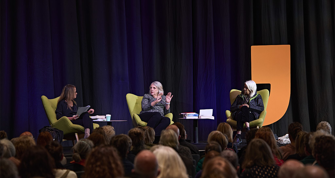“I love listening to experts of almost unimaginable calibre, and hearing all those synapses in my own brain snap together in new formations.”
Explore upcoming events

“No prisons, just sovereignty”
Gamilaroi poet, folklorist and musician Luke Patterson shares his reflections on the first full day of events at the 2022 Sydney Writers' Festival, spanning haunting poetics, robust discussion and literary criticism. Luke is a Juncture fellow with Sydney Review of Books and a member of the 2022 Emerging Writers Festival advisory board. He has written poetry for journals including Cordite, Plumwood Mountain, Rabbit and Running Dog.
You can see Luke at Breaking and Entering: The Next Chapter Writers’ Scheme, How to Write a River, a Sky, a Seed… and Ngana Barangarai (Black Wallaby).
I’m ungracefully hurling myself onto the stage Track 12 at Carriageworks to give Evelyn Araluen a hug and congratulate her on the Stella Prize win. Evelyn has been a kind of impresario, palming off gigs and commissioned opportunities to me for years now. Black poet predecessors have done the groundwork and prepared a fertile field for us to flourish. I can’t stay for the yarn with Ennis Cehic though because I’m heading next door to listen Delia Falconer, Declan Fry and Eda Gunaydin talk criticism (I’ve been trying my hand at reviewing).
The panel deep-dived into that sometimes dark place of criticism. Keeping us sober and optimistic, Delia says to look for the effervescent and interconnected threads of theme and practice that writers develop in response to the evolving literary, technological and social landscape. I’m a sucker for the lyric essay so I appreciate Declan and Eda’s discussion on the complexities of being in the space of both writer and reviewer, criticism as reviewing, specialist or democratic approaches to the complexities of #OwnVoices writing.
Next up, I mean come on, Marcia Langton and Julianne Schultz. I love listening to experts of almost unimaginable calibre, and hearing all those synapses in my own brain snap together in new formations. Sure, they’re wonderful authors but these scholars have done the work, they have a rigour that makes me tremble. Back when I was a sprout at Melbourne Uni, I heard Marcia talk a few times and know by now how her words fall like flint, sparking fire in me. Together they recollected late 60’s histories of resistance, shambolic and autocratic governments, corrupt police and a deep frustration for the trajectory of the country. It was thrilling and terrifying, tracing all this to contemporary political and policy underpinned by imperatives toward action for the environment, and a First Nations voice in parliament.
I’ve made my way on the road south, Wollongong way, to catch the launch of Dreaming Inside: Voices from Junee Correctional Centre vol. 10. For over twelve years, Waddi Waddi Elder Aunty Barbara Nicholson has been journeying to and from the prison collecting leaves of hand-written poems, stories and autobiographical narratives written by First Nations inmates. I’m blown away by the historical, cultural and poetic significance of Dreaming Inside. On Sunday, Aunty Barb and her team will be sitting a panel at Carriageworks, Track 8 at 12pm. I’ll be beside her, reading a few poems from the anthology.
“Most of the time – poem, review, or essay – I’m composing to clapsticks, keeping the musical time in my mind.”
The pre-launch chatter is pierced by the haunting growl of the Yidaki and Dhinawan Dancers bring us into Country. That’s a Worimi wallaby brother I haven’t seen in years, all painted up doing shake-a-leg. I feel safe. Poems are shared, yarns are spun. Aunt takes the stand and delivers her celebration of the fullas inside Junee Correctional. Lessons about the criminal justice system are embedded throughout and remind us of the constant work to be done. Aunt holds and protects so many invaluable stories. Melissa Lucashenko capped the evening by officially launching the anthology into the world. Melissa was talking about big picture, long-term Black futurity and it got me thinking – 250 years is really just a bleep in the history of our people. What is possible in the next 250 years? No prisons, just song and dance and sovereignty? Probably.
But for the moment, First Nations storytellers will do their part healing Country the best they can, changing hearts and minds and winning all the prizes.